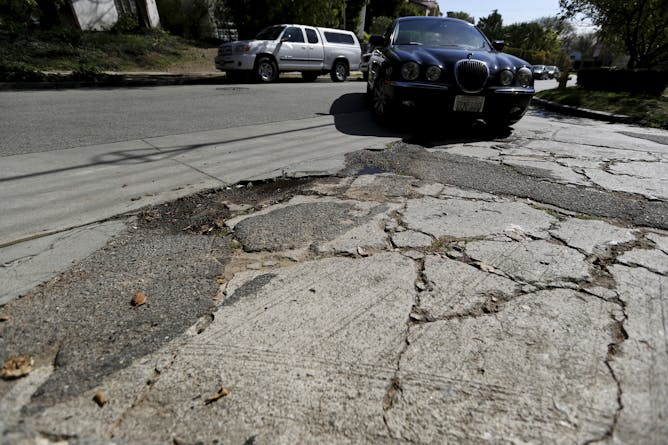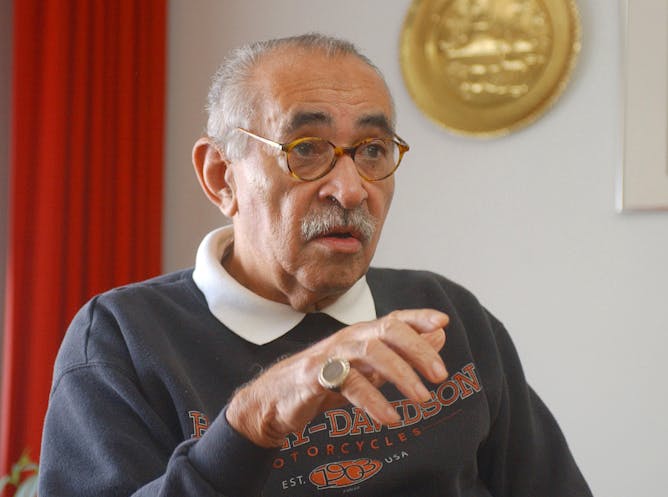Editor's note
|
|
America’s roads and bridges are in terrible shape. And the fuel tax revenue that federal, state and local governments primarily rely on to finance their upkeep has been dropping as cars become increasingly fuel efficient. But with electric cars like the Tesla Model 3 and Chevy Bolt growing in popularity, what happens to the nation’s roads when no one fills up their tanks with gasoline anymore? Boston University economist Jay
Zagorsky investigates.
A group that includes former senior U.S. government officials is lobbying to sell nuclear power plants to Saudi Arabia. But with the world’s second-largest known petroleum reserves, abundant untapped supplies of natural gas and high potential for solar energy, why is Saudi Arabia interested in buying? Some of its motives are benign, writes Chen Kane, director of the Middle East Nonproliferation Program at Middlebury. But some of its
motives are worrisome.
And for Black History Month, University of Richmond’s Taylor McNeilly tells the little-known story of Rev. Wyatt Tee Walker, who played a crucial role in the civil rights movement and was hailed as “one of the keenest minds of the nonviolent revolution” by Martin Luther King Jr.
|
Bryan Keogh
Economics + Business Editor
|

|
|
Top stories
|

U.S. roads are in bad shape.
Reuters/Mario Anzuoni
Jay L. Zagorsky, Boston University
At the moment, fuel taxes pay for most of the maintenance of US roads, bridges and highways. What happens when the majority of cars no longer run on gasoline?
|

Saudi Arabia has many possible motives for pursuing nuclear power.
TTstudio/Shutterstock.com
Chen Kane, Middlebury
Exporting nuclear technology is lucrative, but without strict safeguards, buyers could divert it into bomb programs. Why is Saudi Arabia shopping for nuclear power, and should the US provide it?
|

Rev. Wyatt Tee Walker during a news interview in 2004.
AP Photo/Frank Franklin II
Taylor McNeilly, University of Richmond
Rev. Walker worked closely with King and would be the one to bring King's Letter from Birmingham Jail to public attention. He was the only one who could understand King's handwriting.
|
Health + Medicine
|
-
Gautam Ramesh, University of California San Diego; Andrea LaCroix, University of California San Diego; John Bellettiere, University of California San Diego
Sitting has been maligned in recent years for its role in obesity and diabetes. Now, a recent study in older women suggests that sedentary behavior may also increase heart disease risk.
|
|
Science + Technology
|
-
James Cortada, University of Minnesota
The history of IBM shows how a technology titan can grow and change, while still remaining focused on its core business.
-
Nir Kshetri, University of North Carolina – Greensboro
Chinese users have started posting sensitive materials, like documents of sexual assault, on the blockchain. But the government has taken its own steps to crack down on this practice.
|
|
|
|
|
|
|
|
Most read on site
|
-
Laurie Marhoefer, University of Washington
In the film, the real tensions of gay life in the 1980s – from government apathy towards the AIDS crisis, to rampant anti-gay prejudice – don't get their due.
-
Stanley M. Brand, Pennsylvania State University
Michael Cohen will soon testify before Congress about his work for Donald Trump. But the hearing's subject goes far beyond the committee's jurisdiction, which is government operations and activities.
-
Michelle L.D. Hanlon, University of Mississippi
Throughout the world, unique sites of natural and cultural heritage are protected for future generations. But what about sites on the moon that represent the beginning of the human space age?
|
|
Today’s chart
|
-

 |
Heidi Steinour
University of South Florida
|
| |
| |
| |
|
|